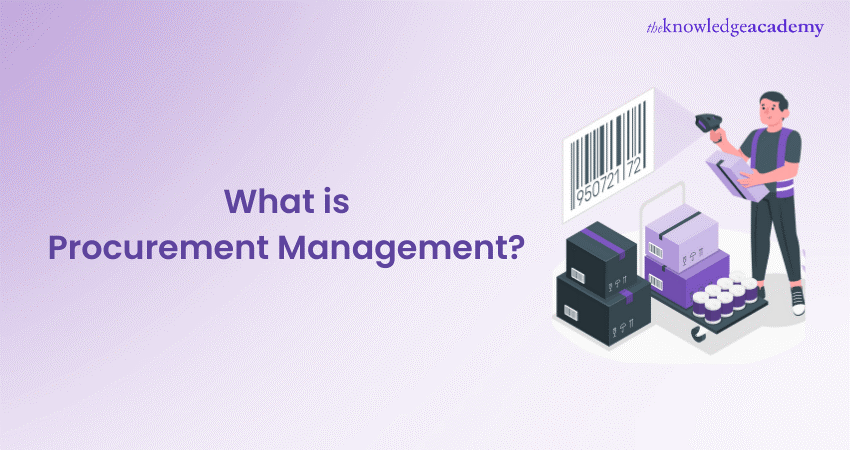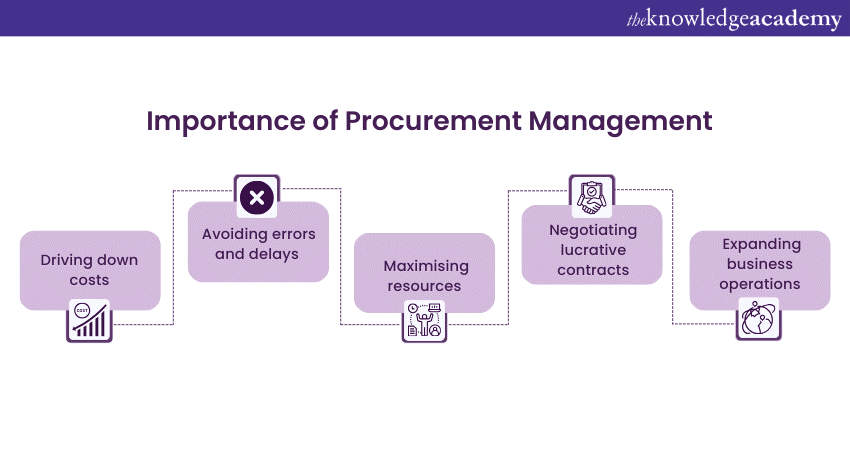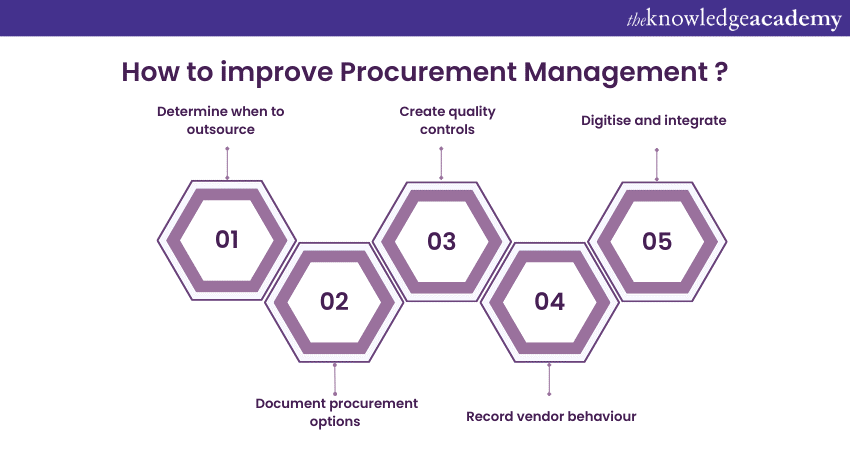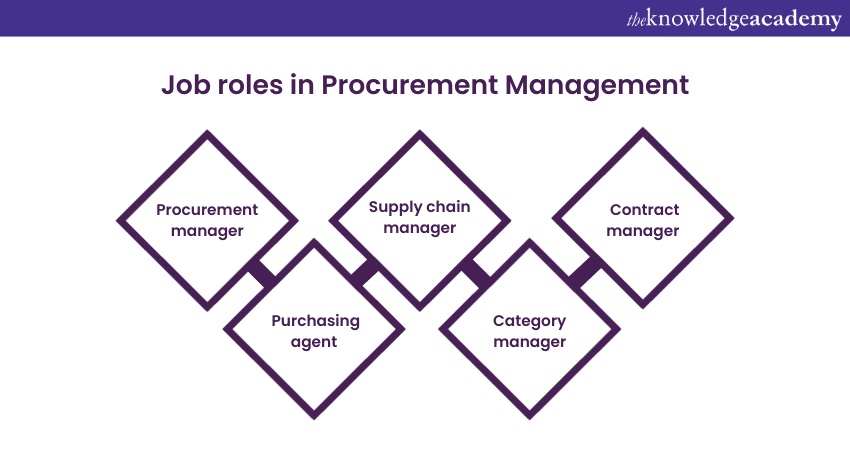We may not have the course you’re looking for. If you enquire or give us a call on 01344203999 and speak to our training experts, we may still be able to help with your training requirements.
Training Outcomes Within Your Budget!
We ensure quality, budget-alignment, and timely delivery by our expert instructors.

What is Procurement Management? The term "Procurement" reflects a straightforward image of a simple buyer-seller transaction. However, in reality, the acquisition of goods and services is a multifaceted process that unfolds across various dimensions.
Procurement Management emerges as the strategic cornerstone for organisations seeking to cut costs, enhance productivity, access vital vendor and product data. It maintains transparency throughout the entire purchase request cycle, from initiation to payment.
To optimise the outcomes of your Procurement Management process, leveraging technology is not merely a recommendation; it's a prudent business practice. In this blog, you will understand what Procurement Management is and how they demand continual oversight and refinement.
Table of contents
1) What is Procurement Management
2) Importance of Procurement
3) Elements of Procurement Management
4) Improving Procurement Management
5) Challenges and risks in Procurement Management
6) Job titles and roles in Procurement Management
7) Conclusion
What is Procurement Management
Procurement Management is a fundamental function within an organisation that contains a set of systematic processes and activities. These processes and activities are aimed at sourcing, acquiring, and managing goods, services or works efficiently and effectively to meet the organisation's needs and objectives.
We define Procurement Management as a process responsible for overseeing and administering all the methods involved in acquiring materials, products, goods, and services needed for efficient operations. It involves multiple stakeholders and departments, such as commercial, legal, technical, and managerial parties. As a business, your Procurement team must carefully balance the needs of all departments to ensure organisational success.
Unlock the future of Procurement excellence – Register for our Procurement Training & Certification Course today!
Importance of Procurement
It would be challenging for most business operations to run efficiently and successfully without Procurement. Procurement is more than just a business necessity; it's a strategic lever that, when used correctly, can give businesses a competitive advantage by driving down costs, avoiding errors and delays, and maximising resources.

Driving down costs
One of the primary roles of Procurement is to drive down costs. This is achieved through various means, such as identifying cost-effective suppliers, negotiating favourable terms, and optimising the Procurement process. Cost savings are not just about immediate gains; they contribute to the organisation's long-term financial health and competitiveness.
Avoiding errors and delays
Effective Procurement is a critical component in preventing errors and delays in the supply chain. By carefully assessing and selecting suppliers, setting quality standards, and monitoring compliance, Procurement reduces the likelihood of defective products or late deliveries. This not only saves time and resources but also safeguards the organisation's reputation and customer satisfaction.
Maximising resources
Procurement plays a pivotal role in resource optimisation. It ensures that the organisation acquires the right quantity of goods and services at the right time. This prevents overstocking or shortages and allows the organisation to allocate resources more efficiently and control unnecessary costs.
Other reasons why organisations need to take Procurement Management seriously include:
Negotiating lucrative contracts
Procurement teams are skilled in negotiating contracts since they work to secure favourable terms, including pricing, delivery schedules, and quality standards. The ability to negotiate lucrative production and supplier contracts is a powerful tool for achieving cost savings and ensuring that the organisation gets the best value for its investments.
Expanding business operations
Procurement is not just a cost-cutting function; it also plays an essential role in expanding business operations. By identifying innovative new processes and strategic supplier partnerships, Procurement can drive growth and open new opportunities for the organisation.
Corporate social responsibility and diversity
Today, Corporate Social Responsibility (CSR) and diversity are becoming increasingly important. Procurement can spearhead CSR efforts by proactively partnering with diverse suppliers, supporting ethical sourcing practices, and contributing to the organisation's commitment to social responsibility. This not only aligns the organisation with societal values but can also lead to a more inclusive and innovative supplier network.

Elements of Procurement Management
The Procurement Management process is a structured cycle that starts with selecting resources to acquire and receiving and paying for those resources. It is a complex and multifaceted system that involves a series of steps, each of which requires careful coordination and documentation to ensure the smooth and efficient operation of an organisation's Procurement activities.
The primary features of Procurement Management encompass various elements:
Planning
Planning consists of assessing needs, budgeting and communication.
a) Needs assessment: Before making any purchases, the Procurement team engages in a thorough planning phase, identifying and assessing the goods and services necessary for the organisation's operations. This involves a detailed analysis of the needs of different departments and projects.
b) Budgeting: In this phase, budgets are set for each category of Procurement, which allows the organisation to allocate resources effectively. A well-structured budget ensures that Procurement activities align with the organisation's financial objectives.
c) Communication: To maintain seamless coordination, Procurement teams establish communication systems that allow company employees to stay informed about the status of various Procurement processes. This ensures that all stakeholders are aware of the progress and can collaborate effectively.
Vendor selection
The next significant element is selecting suitable vendors to fulfil the Procurement needs. This process involves thorough research and the application of specific criteria, such as quality, safety, company policies, reliability, cost, delivery times, and more. Efficient Procurement Management often involves having a list of potential suppliers, which allows for backup options in case a primary supplier encounters unexpected issues.
Purchase requisition
After successful contract negotiations, the Procurement team starts the formal Procurement process by submitting purchase requisitions. These requisitions are requests for funds to make specific purchases from approved vendors. This legal process ensures that employees do not make purchases at their discretion, preventing duplicate orders or assets from the wrong supplier.
Following purchase requisition approval, the team communicates with suppliers to initiate the Procurement process. This step ensures that orders are placed in accordance with the contract terms.
Delivery
The heart of Procurement Management is the actual receipt of goods or services through on-time deliveries. This phase involves a range of activities, including meeting with suppliers to establish delivery timelines, tracking shipments, reviewing purchase orders, scheduling employees to receive shipments, and conducting quality inspections. This is to ensure that the received items meet the specified quality standards.
Invoice management
The final phase of the Procurement Management cycle involves paying vendors and managing invoices. This includes reconciling orders with the actual goods and services received, balancing company accounts, and tracking receipts. Invoice management practices are essential for monitoring the cost-effectiveness of vendor relationships over time and identifying opportunities to utilise the Procurement budget more effectively.
Ready to revolutionise your career in your industry? What are you waiting for? Check out our Industry Training!
Improving Procurement Management
Being intentional about your Procurement Management practices can significantly impact your team's bottom line and functionality. Here are steps that explain how to refine and improve the Procurement Management system at your workplace to optimise efficiency and cost-effectiveness:

Determine when to outsource
Selecting the suitable goods and services to outsource is a critical aspect of effective Procurement Management. Research the costs and benefits of handling various aspects of your business internally or externally. By aligning your Procurement strategies with the decision to outsource, you can focus your efforts effectively.
Gather data about the initial costs of setting up production and the long-term budget needed to access resources through different channels. This data-driven approach ensures that your Procurement decisions are aligned with your organisation's financial objectives.
Document Procurement options
Create a comprehensive database of potential suppliers that your team can readily access as your business grows and changes. This database streamlines the process of researching and contacting potential suppliers, improving the efficiency of Procurement efforts.
Having a centralised database also makes it easier to validate requests and information in the future as orders and demand increase. It ensures that your team can access reliable data and make informed Procurement decisions.
Create quality controls
Ensuring that outsourced resources meet quality expectations is essential for efficient operations. Collaborate with vendors to agree on quality specifications and establish quality control processes.
Quality control can include automated assessments and manual inspections upon receipt of goods. This approach prevents financial losses, inefficiencies, and waste, ensuring that your organisation consistently receives high-quality products and services.
Record vendor behaviour
Keep a record documenting vendor behaviour, including late shipments, quality issues, cost increases, and other issues. Tracking vendor activities allows you to make informed purchasing decisions and adjust Procurement strategies to avoid unreliable behaviour.
Regularly analyse this data to maximise profits, maintain efficiency, and prevent delays in delivering products to consumers. This analysis ensures that you make strategic decisions based on past vendor performance.
Digitise and integrate
To improve your Procurement Management process, consider using software and digital tools to integrate each step in the process. Automated software systems keep your team coordinated, from making purchase requests to confirming shipments.
Integration simplifies data analysis and efficiency reports, enabling more informed business decisions. By leveraging technology, you streamline Procurement processes and enhance overall efficiency.
Set up notifications
Create a system that automatically notifies people in specific roles when certain actions or tasks occur within the Procurement process. Configuring your Procurement Management system to provide instant updates improves internal communication and prevents workflow or approval issues.
Notifications enhance efficiency, transparency, and accountability within the Procurement Management process. This ensures that all team members are aware of task statuses and can respond promptly.
Ready to create exceptional environments and shape the future of Facilities Management? Sign up for our Facilities Management Training now!
Challenges and risks in Procurement Management
Efficient Procurement Management is not without its share of challenges and risks. Identifying and addressing these issues is essential for the successful execution of Procurement processes. Here are some common challenges and risks in Procurement Management:
a) Supplier dependence: Relying heavily on a single supplier or a small group of suppliers can be risky. If a key supplier faces disruptions, such as financial instability, production issues, or natural disasters, it can lead to significant supply chain disruptions.
b) Supply chain disruptions: Disruptions in the supply chain, such as natural disasters, geopolitical conflicts, or unexpected events like the COVID-19 pandemic, can lead to delays and shortages.
c) Quality assurance: Ensuring the quality of procured goods and services can be challenging. Substandard quality can lead to defective products, customer dissatisfaction, and costly rework.
d) Cost overruns: Procurement activities often have budgets and cost controls. Unexpected price increases, changes in contract terms, or fluctuating market conditions can lead to cost overruns.
e) Compliance and regulatory risks: Many industries are subject to strict regulations and compliance requirements. Non-compliance can result in legal issues, fines, and damage to the organisation's reputation.
f) Vendor reliability: Some suppliers may exhibit inconsistent behaviour, leading to late shipments, quality issues, and increased costs.
g) Communication and coordination: Effective communication and collaboration between Procurement teams and other departments are essential but can be challenging.
h) Ethical and environmental concerns: Ensuring ethical and sustainable sourcing can be complex, with pressure to adhere to ethical and environmental standards.
i) Technology integration: Adopting and integrating Procurement technology can be challenging, especially for organisations with legacy systems.
Job titles and roles in Procurement Management
Procurement Management encompasses a wide range of responsibilities and functions, each requiring a distinct set of skills and expertise. Here are some of the key roles and job titles commonly found in Procurement Management:

Procurement manager
Procurement managers oversee the entire Procurement process. They are responsible for setting Procurement strategies, managing vendor relationships, negotiating contracts, and ensuring that the organisation's Procurement activities align with its goals.
Skills: Strong negotiation skills, strategic thinking, financial acumen, and leadership abilities.
Purchasing agent
Purchasing agents focus on the tactical aspects of Procurement. They handle day-to-day purchasing activities, process purchase orders, and work closely with suppliers to secure goods and services.
Skills: Attention to detail, organisational skills, and proficiency in Procurement software.
Supply chain manager
Supply chain managers play a crucial role in optimising the supply chain. They are responsible for managing logistics, inventory, and distribution to ensure a smooth flow of goods from suppliers to consumers.
Skills: Knowledge of supply chain optimisation, problem-solving, and data analysis.
Category manager
Category managers specialise in specific Procurement categories such as IT, marketing, or raw materials. They are responsible for developing category-specific strategies, identifying potential suppliers, and managing supplier relationships within their category.
Skills: In-depth knowledge of the specific category, market research, and strong negotiation skills.
Contract manager
Contract managers are responsible for creating, managing, and enforcing supplier contracts. They ensure that all parties adhere to the terms and conditions of the contract.
Skills: Legal knowledge, attention to detail, and strong communication skills.
Sourcing specialist
Sourcing specialists focus on identifying and evaluating potential suppliers. They research suppliers, assess their capabilities, and negotiate terms to secure the best value for the organisation.
Skills: Market research, supplier evaluation, and negotiation skills.
Procurement analyst
Procurement analysts collect and analyse data related to Procurement activities. They provide insights and recommendations to improve Procurement processes, reduce costs, and enhance efficiency.
Skills: Data analysis, reporting, and proficiency in data analysis tools.
Supplier relationship manager
Supplier relationship managers focus on building and maintaining strong relationships with key suppliers. They collaborate with suppliers to ensure that contractual terms are met, and they seek opportunities for mutual growth and improvement.
Skills: Interpersonal skills, relationship-building, and negotiation skills.
Conclusion
So, What is Procurement Management? Procurement Management is not just about buying goods and services; it's a strategic business function that can significantly impact an organisation's success. Effective Procurement Management can lead to cost savings, improved quality, and enhanced efficiency. Organisations should adopt a culture of continuous improvement, regularly assessing and optimising their Procurement processes.
Supercharge your global trade skills with our Importing and Exporting Masterclass – Register today!
Frequently Asked Questions
Upcoming Business Skills Resources Batches & Dates
Date
 Contract Management Certification Training
Contract Management Certification Training
Thu 11th Jul 2024
Thu 19th Sep 2024
Thu 12th Dec 2024







 Top Rated Course
Top Rated Course


 If you wish to make any changes to your course, please
If you wish to make any changes to your course, please


